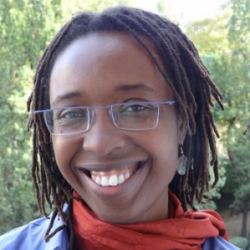
Tendai Chitewere
I am originally from Zimbabwe and grew up in the mountainous region between Zimbabwe and Mozambique—the Vumba Mountains and Chimanimani National Park. The Eastern Highlands of Mutare is where the plateau of Zimbabwe meets the mountains that runs along the Eastern edge of the African continent. From an early age I gained an appreciation of the natural environment and was fascinated by the geology and fauna that surrounded me. I moved to the East Coast of the United States in the mid-1980s and went to school at the State University of New York at Oneonta where I studied mathematics and physics until I discovered its applications outdoors in the form of water resources and geology. I loved learning about other cultures and minored in anthropology. After graduating, I pursued a Master’s in Agriculture Engineering at Cornell University. As my love of STEM and commitment to social justice and environmentalism grew, I became interested not only in how humans impacted the environment, but how human behavior held the key to social and ecological change. A doctorate in Environmental Anthropology from Binghamton University (State University of New York) allowed me to examine questions of development, social justice, and the environment in great detail.
I’m currently a professor of geography & environment at San Francisco State University. Where I am broadly interested in the intersection of environmentalism, community, and justice. My work focuses on individual, neighborhood, and government responses to social and environmental degradation and builds on my early research of ecological cohousing communities.
My research is in the interdisciplinary ethnographic study of sustainable communities. I am broadly interested in all forms of emerging green communities, including co-housing eco-villages, eco-cities, green cities, and transition towns. As a political ecologist, I explore the relationship between structures of power and the natural environment. Specifically, I'm interested in individual and neighborhood responses to social and environmental degradation and how these responses reflect lifestyle choices, social capital, and access to power. My work questions the compatibility between green consumption and capitalism, and examines ways to make equity and justice matter in the search for a sustainable way to live. As an applied environmental anthropologist, my work is grounded in ethnography with strong interest in mixed research design that supports participatory community-based research.
My Sustainable Communities and Local Environments (SCALES) Lab includes various urban sustainability project from urban agriculture in Oakland, California (Eating the Front Yard) to Anchoring Out in Sausalito, California, to an examination of sustainable communities in Europe, and specifically in Berlin, Germany.